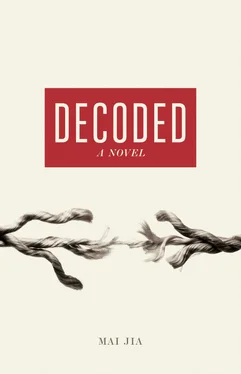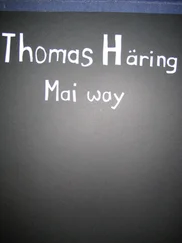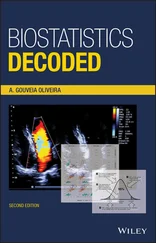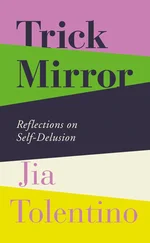Mai Jia - Decoded
Здесь есть возможность читать онлайн «Mai Jia - Decoded» весь текст электронной книги совершенно бесплатно (целиком полную версию без сокращений). В некоторых случаях можно слушать аудио, скачать через торрент в формате fb2 и присутствует краткое содержание. Год выпуска: 2014, Издательство: Allen Lane, Жанр: Современная проза, на английском языке. Описание произведения, (предисловие) а так же отзывы посетителей доступны на портале библиотеки ЛибКат.
- Название:Decoded
- Автор:
- Издательство:Allen Lane
- Жанр:
- Год:2014
- ISBN:нет данных
- Рейтинг книги:3 / 5. Голосов: 1
-
Избранное:Добавить в избранное
- Отзывы:
-
Ваша оценка:
- 60
- 1
- 2
- 3
- 4
- 5
Decoded: краткое содержание, описание и аннотация
Предлагаем к чтению аннотацию, описание, краткое содержание или предисловие (зависит от того, что написал сам автор книги «Decoded»). Если вы не нашли необходимую информацию о книге — напишите в комментариях, мы постараемся отыскать её.
Decoded — читать онлайн бесплатно полную книгу (весь текст) целиком
Ниже представлен текст книги, разбитый по страницам. Система сохранения места последней прочитанной страницы, позволяет с удобством читать онлайн бесплатно книгу «Decoded», без необходимости каждый раз заново искать на чём Вы остановились. Поставьте закладку, и сможете в любой момент перейти на страницу, на которой закончили чтение.
Интервал:
Закладка:
7
As it turned out, due to the ‘unhealthy contents’ of this letter, Rong Jinzhen was not allowed to read it. There was a rule in Unit 701: don’t ask forbidden questions, don’t discuss forbidden topics, don’t try and find out about forbidden things. As far as the Party was concerned, the fewer letters of that type that turned up the better — it just caused trouble. The Party was having to keep far too many things secret from its own people already.
As it turned out, this simple method of trying to get rid of the problem didn’t work where Rong Jinzhen was concerned. A month later the surveillance team received another letter for him. This time it had come all the way from X country. X country — how sensitive was that! When they opened it up, it was written in English. Looking at the signature, it was another missive from Jan Liseiwicz. This letter was much longer than the first one. Yet again, Liseiwicz was trying to persuade Jinzhen to go back to his original research, and expressed even greater regret that he had given it up midway. He began the letter by discussing various articles he had read in mathematics journals concerning the most recent advances in research into artificial intelligence, but then (as if turning to the main subject of the communication) he said:
It was a dream that decided me to write this letter to you. To tell you the truth, the last couple of days I have been wondering what you are doing now and what reward you were offered (or what pressure you were placed under) that resulted in you making such a startling decision. Last night, you appeared in my dreams to tell me that you were working for a top-secret unit in your country and that you have become a cryptographer. I do not know why I have had this dream; I have neither the knowledge nor the experience to be able to interpret what I experience in my dreams and relate it to real events — maybe it was just a dream and does not mean anything at all. I hope that is all it was; just a dream! However, I believe that this dream represents my hopes and fears for you — I am worried that your genius has attracted the wrong kind of attention and they are going to force you into this kind of work. Whatever happens you must not agree. Why do I say that? There are two reasons:
I. The NaTure of CrypTographyNowadays many mathematicians are involved in the world of cryptography and so some people have begun to claim that it is a science in its own right; as a result many people have been attracted into the field and some of them have even ended up sacrificing their lives. Nothing that they have done has succeeded in changing my opinion of ciphers; in my experience, regardless of whether you are talking about the construction of ciphers or their decryption, they are fundamentally anti-scientific, anti-intellectual; they are a poison that mankind has developed to destroy science and a conspiracy against the people that work with them. You need intelligence to work in cryptography, but it is a devilish intelligence; every success that you achieve in this field forces other people to become more inventively evil, more fiercely cunning. Ciphers are a kind of concealed warfare, but it is pointless to win this kind of battle, because it achieves nothing.
II. your CharaCTer
As I have said before, you have a very acute but also fragile intelligence, as well as an obsessive character — these are the classic signs of an excellent scientist, but they also mean that you are fundamentally unsuited to cryptography. Top-secret work involves a lot of pressure; it means that you have to subordinate your own personality and demands to that of your work — do you think you can do that? I am quite sure that you can’t, because you are at once too fragile and too stubborn — you are simply not resilient enough. If you are not very careful, this work will break you! You ought to know for yourself under what circumstances people develop their ideas. It is when they are relaxed, when they are free to let their thoughts roam, when no demands are placed upon them. But from the moment you first take up cryptography, you are heavily circumscribed; your actions are controlled on all sides in the interests of national security — you are under pressure. It is crucial here to think about what your country is. I often ask myself, what is my country? Is it Poland? Is it Israel? Is it England? Is it Switzerland? Is it China? Or is it X?
Now I have finally come to understand that when people talk about ‘their country’ they mean their relatives, their friends, their language, the bridge they cross when they go to work, the little stream that runs past their house, the woods, the paths, the gentle wind blowing from the west, the chirping of the cicadas, the fireflies at night, and so on and so forth — not a particular piece of land confined within set borders, nor the object of a nationalist party or demagogue’s veneration. To tell you the truth, I have a great deal of respect for the country in which you are living, because I spent the happiest years of my life there. I can speak Chinese; I have many family and friends there, including some now sadly dead. Thanks to my family and friends there — living and dead — I have a host of memories that are inextricably linked with that country. In many ways you could say that your country — China — is also my country, but that doesn’t mean that I want to deceive myself, nor that I want to lie you. If I didn’t say these things to you, if I didn’t point out the constraints of your present position and the dangers that you will have to face, then I would indeed be lying to you. .
It seems as though Liseiwicz felt with this letter that he had burned his boats, because less than a month later, a third letter arrived. This time he was very angry and he complained vociferously because Jinzhen had not written back. He clearly had his own opinion about why not –
If you don’t reply, it means that you are involved in this work — decrypting ciphers!
His reasoning was simple enough to understand: silence = agreement = admission.
Afterwards, trying hard to control his emotions, he went into considerable detail about his reasoning. This is what he said:
I do not know why, but every time I think about you, I feel as though my heart is being run through a wringer — I feel completely helpless. Everyone has some regrets in their life; maybe you are mine. Jinzhen, dear Jinzhen, what has happened to make me so worried about you? Please tell me that you are not involved in cryptography — I have been so worried that it is giving me nightmares. With your genius, with the research subjects that you have picked, with your long silence — I am more and more worried that my dream is correct. Ciphers are accursed things! They are very sensitive, they take the people that touch them and enfold them in a close embrace — it is a prison sentence; they might as well drop you at the bottom of a dark pit and forget about you! Dear Jinzhen, if this is true, then you must listen to me; if you have an opportunity to go back, take it! If you are offered even the slightest chance, do not hesitate: take it! If you have no opportunity to go back, then you must remember the following advice. You can work on any cipher they need you to decrypt, but you must never, ever work on PURPLE!
PURPLE was the most difficult cipher that Unit 701 had ever been charged with breaking. Rumour had it that some religious organization had spent a lot of money (not to mention resorting to gangster methods) to cajole and threaten a mathematician into creating this cipher for them. After he had developed it, because it involved so many procedural steps, because it was so difficult, because there were further internal ciphers contained within the main encryption method, because it was so damn complicated, because it was so mysterious and arcane, the new owners had no idea how to use it, so in the end they sold it to X country. At the moment, it was the highest level cipher used by the military in X country and hence of course it was also the cipher that Unit 701 most wanted to decrypt. For the last couple of years, the geniuses in Unit 701’s cryptography division had been wracking their brains over it; they had worked so hard, suffered so much, thought about it day and night, waking and sleeping; apparently the only result was that people were getting more and more scared to even touch it. The fact is that the lunatic went mad as a result of working on PURPLE. Or to put it another way, the lunatic was driven mad by the anonymous mathematician who originally developed PURPLE. Those who had escaped this fate had done so not because they were so much mentally stronger, but because they were too cowardly — or maybe that should be too clever — to even touch PURPLE. They were clever enough to know what the result would be of beginning to work on it, so you could say that refusing to even touch it was a sign of their good sense. This was a trap, a black hole; anyone sensible would avoid it like the plague. The only person foolhardy enough to give it a go had been driven mad and that made people even more cautious, even more determined to give it a wide berth. Given what Unit 701 had already been through to try and decrypt PURPLE, they were at one and the same time both desperate to crack it and completely incapable of doing so.
Читать дальшеИнтервал:
Закладка:
Похожие книги на «Decoded»
Представляем Вашему вниманию похожие книги на «Decoded» списком для выбора. Мы отобрали схожую по названию и смыслу литературу в надежде предоставить читателям больше вариантов отыскать новые, интересные, ещё непрочитанные произведения.
Обсуждение, отзывы о книге «Decoded» и просто собственные мнения читателей. Оставьте ваши комментарии, напишите, что Вы думаете о произведении, его смысле или главных героях. Укажите что конкретно понравилось, а что нет, и почему Вы так считаете.












